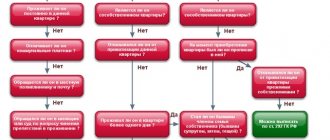Quite often, courts, interpreting one or another rule of law, “invent,” in essence, a new rule, thereby changing or supplementing the law, which is the prerogative of the legislative branch of government, but not the judicial branch. At the same time, “judge-lawmakers,” apparently, are not particularly bothered by the fact that their interpretation often contradicts not only the letter of the law, but also its spirit. As a result, instead of justifying “why the defendant is wrong,” the court, without any comments, will simply indicate in the decision: “the defendant’s arguments are based on an incorrect interpretation of article such and such,” while forgetting that the court decision must be justified, otherwise it cannot be legal.
The norm of paragraph 4 of Article 252 of the Civil Code of the Russian Federation became such a “victim” of judicial interpretation. As practice shows, judges of courts of general jurisdiction believe that a participant in shared ownership (if his share is insignificant) can be deprived of the right of ownership to a share in the common property even in the absence of his will to terminate the right of shared ownership. For clarity, let's give an example. You are the owner of 1/5 of the apartment’s share, and the other co-owner has 4/5, respectively. If you follow the letter of the law, no one can deprive you of your share, no matter how small it may be, except for the case when you yourself went to court with a claim for the allocation of your 1/5 share in kind, and the court found that the allocation of the share is technically impossible. The court (of general jurisdiction), most likely, will judge the opposite, and, at the request of your co-owner, will terminate your right to the share, with payment of compensation to you.
We also recommend a later publication on this topic: Compensation instead of allocating a share in kind under clause 4 of Art. 252 Civil Code of the Russian Federation Judicial practice
The procedure for determining shares in an apartment
According to the law, shares in an apartment can be determined in the following ways:
1. Based on the current rule of law. For example, as follows from Art. 1141 of the Civil Code of the Russian Federation, the shares of heirs in the property of the deceased are equal. So, if the testator had 3 sons, but one of them died and has 2 children, in case of inheritance by law, the sons will receive 1/3 of the share, and the grandchildren of the testator will receive 1/6 of the share.
2. Based on the agreement of the participants (shareholders, owners). For example, people who have invested in the purchase of an apartment can independently determine the size of the share, depending on the amount of each person’s contribution. The agreement must be in writing and registered with Rosreestr.
If the shares were not determined in the ways described above, then they are considered equal.
In practice, there are cases when the size of the property of one of the shareholders increases due to inseparable improvements made by him in the condition of the apartment. For example, during the period of owning a residential property, one of the participants reconstructed the engineering systems in the apartment (sewage, heating), installed new plumbing and plastic windows. Accordingly, the market value of the property increased, so that after the decision to allocate a share in the apartment in kind, he received the right to claim a larger area than is stated in his title documents.
An increase or decrease in property is possible by agreement of the owners or through the courts. In the latter case, a judicial assessment of the condition of the apartment before and after the improvements will be of decisive importance in resolving the dispute.
How is the regime for using property in shared ownership established?
If we talk about the rules for the operation of such property, then it should be noted that the mode of use is established and agreed upon in the agreement on joint use. In such an agreement, a mandatory clause states that the use of his share by one owner cannot limit the rights of the owners of other shares located in this premises.
The agreement also stipulates that common property, such as stairs, corridors, etc., is in shared ownership. must be used by all owners, regardless of the size of their shares, and restrictions created by some owners in relation to others are considered illegal.
Conditions for dividing an apartment
Current legislation defines the following conditions:
1. Division is possible if it is possible to organize a premises suitable for living with a separate entrance and independent communications. That is, the area must be at least 28 square meters. m. (SNiP 31-01-2003), and the operation of engineering systems cannot be made dependent on the will of another person. That is why it is impossible to allocate a share in kind in a one-room apartment, since it will be technically impossible to create an independent connection to sewerage, water supply, and heating in the premises.
In practice, it is possible to divide without any problems only large-area housing, where there are several sanitary rooms (bathrooms, toilets) or apartments that are located on the 1st floor. In the latter case, it is possible to arrange a separate entrance and conduct independent communications.
2. Unauthorized alterations are not taken into account when dividing an apartment. Moreover, their presence may result in refusal to grant permission to allocate a share.
Allocation of a share of land or non-residential real estate
How to allocate a share in kind if a land plot is subject to division? When allocating a natural share, co-owners of a land plot need to take into account several factors:
- the isolated plot cannot have a footage less than that established by regional legislation;
- its borders should not violate the borders of the neighboring plot;
- the site must be used for its intended purpose;
- When dividing a land plot, land surveying is mandatory.
When dividing outbuildings and other non-residential real estate (garages, utility rooms, workshops, etc.), the plot of land on which they are built is also divided. If the owners cannot agree on the allocation of property in kind, they can buy out their shares from other owners.
Section of residential premises in the "communal apartment"
Federal legislation still does not provide a legal definition of the concept of “communal apartment.” In fact, it refers to premises of 5 or more rooms belonging to people who are not members of the same family and acquired their right independently of others.
At the moment, laws do not allow for the allocation in kind of a share in a communal apartment, since the owners do not have the opportunity to organize premises with a separate entrance and their own communications (toilet, bathroom).
The only “chance” for allocation may be for the owners of several rooms located on the 1st floor of buildings. In this case, you can create a separate entrance and organize a connection to the nodes of engineering systems. The financial costs will be very significant.
Restrictions on allocating a share
Division of an apartment may not be possible in the following cases:
- The allocation of a share in an apartment in kind will result in damage to load-bearing walls and common areas, and will also create obstacles for persons living in an apartment building to use residential premises.
- Violation of property rights and legitimate interests of interested parties (creditors registered in residential premises, etc.).
- The premises formed as a result of the allocation will be unsuitable for habitation, according to Art. 16 Housing Code of the Russian Federation. Most often, it is on this basis that the court rejects the claim for the allocation of a share of the apartment in kind.
Perhaps expediency?
Maybe so. Indeed, many owners of residential premises and, as a result, insignificant, small shares appear, as a rule, as a result of accepting an inheritance when there are several heirs. Then small shares are inherited by their heirs and 1/50, 1/70, or even 1/100 shares in the right appear. Such shares, of course, are not significant, and their owners often abuse the right: they ask, for example, to buy back their share from a co-owner at an inflated price, otherwise they threaten to move in as an owner and not allow them to “live in peace” (while having other suitable property for living quarters).
However, I am nevertheless convinced that the advisability of too “free” interpretation of certain rules of law for the sake of supposedly public interests is unacceptable. After all, it turns out that expediency is on one side of the scale, and legality is on the other. Which is more significant, I think, is obvious.
Division of an apartment on a “voluntary” basis
According to Art. 252 of the Civil Code of the Russian Federation, the allocation of a share in an apartment in kind by agreement of the parties must be carried out. At the same time, the owners have the right to determine for themselves the extent to which they will exercise the right to divide residential premises, and the exercise of their power does not in any way affect the rights of other shareholders.
For example, in 2015, the St. Petersburg City Court in one of the appeal rulings indicated that the allocation of a share in an apartment in kind does not violate the rights and freedoms of other owners (shareholders), since it does not entail a change in the title of another owner in relation to the shared property.
When reaching agreement on the division of property in kind, you must proceed according to the following algorithm:
- Obtaining permission to change the layout of the apartment, since the section involves the organization of completely new objects (essentially, reconstruction).
- Formation of a separate living space, that is, construction work itself.
- Drawing up a technical plan that takes into account changes made to the design of the apartment. To do this, you need to contact a cadastral engineer.
- It is necessary to conclude a written agreement with other apartment owners on the division of the apartment.
- Submit an application to Rosreestr for registration of rights to the created residential premises.
Features of an apartment division agreement
According to Part 1 of Art. 252, the allocation of a share in kind can be made by agreement between the owners. It means a written document drawn up according to the following rules:
- An agreement on the allocation of a share of an apartment in kind is signed by all share owners. Subsequently, each of them receives their own copy.
- The content describes in detail the subject of discussion on which the parties reached agreement (allocation of a share with the formation of a separate living space).
- Compensation payments must be provided. In practice, it is rarely possible to achieve equality between the size of the share in the property and the area of the allocated premises. For example, an apartment area of 90 sq. m is owned by 2 persons, one of whom allocates premises with a total size of 42 sq. m. m. He will need to compensate for the “lost” 3 sq. m. m.
The number of copies of the agreement is equal to the number of share owners, but one is intended for Rosreestr. Notarization is not required.
Procedure for registering allocated premises
Registration of changes in ownership of an apartment is mandatory. In accordance with Parts 1-2 of Art. 14, part 8 art. 41 of Law No. 218-FZ requires the following:
- Statements from all shareholders. The one who allocated the premises registers his property, and others make changes to the Unified State Register about their rights.
- Title documents for the apartment, division agreements (all copies), applicants’ passports and a copy of the technical plan or its identification number are presented.
- Documents confirming payment of state duty. The allocated shareholder pays 2 thousand rubles, and other owners - 350 rubles.
You can register your right both at the Rosreestr Branch and at the MFC. The duration of the procedure for making changes to the Unified State Register is 10-12 days, after which applicants receive statements of their rights and agreements on the division of an apartment with a registration mark.
What is meant by shared ownership?
Shared ownership of any real estate is considered to be a form of management and ownership of a property in which this object is owned by two (or more) owners who have equal rights to the property. Shared ownership arises for various reasons, but each of them is necessarily reflected when drawing up title documents for real estate.
The most common reasons for the emergence of shared ownership:
- Several future co-owners jointly buy a piece of real estate, with each of them paying a certain fee; it is understood that in the future each of them can physically allocate their share for independent use, ownership and disposal.
- Several citizens are privatizing real estate that previously belonged to the state or municipality. In this case, the purpose of the object (residential or non-residential) does not matter.
- Several heirs, in accordance with a will or right of inheritance, receive one piece of real estate as an inheritance. In this case, the shares can be divided equally or in any other order in accordance with the will or the right of inheritance.
For example, the owner of a non-residential building that is rented out as offices died unexpectedly without leaving a will. The heirs are his wife and adult son. The building was purchased during the marriage, so in the absence of a prenuptial agreement, the wife owns half of the property. The second half of the building is divided equally between the heirs of the first stage - his wife and son.
Thus the widow receives three-quarters of the property and the son one-fourth. As a percentage, the widow will have 75%, and the son will have 25% of the property.
Another basis for the emergence of shared ownership is the sale by the owner of the property of a part of it.
For example, the owner of the same non-residential building that we talked about in the first example sells part of the premises to another owner. In this case, the buyer becomes the owner of part of the building, and both of them (the seller and the buyer) become participants in the shared ownership of the entire property, which is the above building.
In cases of shared ownership, all co-owners must determine such a mode of use of the object in which none of the owners can in any way limit the rights of others.
Allocation of shares in court
Applying to the court with a claim for division of the apartment is necessary if it was not possible to reach an agreement with the other share owners. The following procedure must be followed:
1. Preparation of the necessary documentation.
- Technical passport in the BTI authorities.
- An extract from the Unified State Register with a description of the building where the apartment is located.
- A conclusion on the possibility of allocating a share in kind, prepared by the BTI or a specialized organization.
- Copies of title documents.
2. Drawing up a statement of claim.
The document is drawn up according to the rules provided for in the Code of Civil Procedure of the Russian Federation. According to Art. 30, it is filed with the district (city) court at the location of the real estate. In this case, the content must indicate:
- Detailed description of the apartment and the applicant’s share in it (size, ownership documents).
- Characteristics of the allocated premises with a list of work that will need to be carried out to create it.
- If it is impossible to allocate a share in an apartment in kind, the statement of claim must contain a demand for compensation with a calculation of the amount. To do this, you must provide an opinion on the market price of the property prepared by an expert organization.
3. Participation in court hearings.
During the consideration of the case, it is necessary to prove that dividing the apartment is technically possible and will not violate the rights and legitimate interests of other persons. The latter means not only participants in shared ownership, but also owners of other apartments, as well as owners of utility networks and service organizations.
Third Party Claim Section
A claim for the allocation of a share of an apartment in kind can be filed not only by one of the owners, but also by a person who is not related to the residential premises, but whose property interests are violated by the actions or behavior of the owner.
For example, if it is impossible to fulfill a loan agreement, the creditor may apply to the court with a demand for the allocation of a share in the apartment (or joint property, if the apartment was purchased during marriage). In this case, he has the right to declare the following:
1. If the allocation of a share in an apartment in kind is impossible (small area), then the court makes a demand that the debtor be obliged to sell his part of the residential premises to another shareholder at the market price.
2. If the owners of the share refuse to purchase part of the debtor’s apartment, then it is sold at public auction.
Currently, in Russian law enforcement practice, a position has emerged according to which the right to demand the forced allocation of a share in an apartment in the event of insufficient funds to repay debts is granted to the creditor. The debtor's spouses and other apartment owners do not participate in this case.
What is a contract (agreement) and when is it necessary?
An equity participation agreement is considered to be an agreement concluded, which is signed by the future co-owners of non-residential premises at the stage of its construction.
This is the most common equity participation agreement, the main condition of which will be co-financing of the construction of such premises.
The conclusion of such an agreement is carried out in cases where the premises are not being built on their own (for example, the future co-owners independently hired a construction organization that will carry out the construction of an office center according to a previously developed project), and the future co-owners contribute money to obtain a guarantee of ownership of a specific premises after the building is handed over to the acceptance committee.
Moreover, when concluding such an agreement, the co-owners may not even know about each other’s existence, since the parties to such an agreement will be the person who contributes funds and subsequently acts as the acquirer of a certain area (or premises) in such a house, and the developer himself , benefiting from the sale of the areas he builds.
In rare cases, a share participation agreement is concluded between the owners of shares in a specific non-residential premises, if such premises will be reconstructed or rebuilt.
However, this type of agreement is still one of the subtypes of classic share participation agreements, according to which each acquirer of a share contributes the amount of funds that corresponds to the size of the share he is acquiring.
Agreement for participation in shared construction of non-residential premises
Apartment section. Examples of judicial practice
Courts of general jurisdiction often consider applications requesting the allocation of a share of an apartment in kind. Judicial practice on this issue is very diverse, since the outcome of each case is influenced by many factors.
Example #1
To resolve the dispute, the court may order an examination to establish the technical feasibility of dividing the apartment, the amount of redevelopment costs and their relationship with the price of the object itself.
Example No. 2
If it is impossible to allocate without damaging the entire apartment, the owner has the opportunity to receive payment of the price of the share by other participants. Moreover, this right is exercised on the condition that other shareholders agree to accept part of the applicant’s property into their ownership.
Example No. 3
As an exceptional measure, it is possible to deprive the owner of his share in the apartment. It is initiated by the creditor, who is also the owner of part of the premises, subject to the following conditions:
- Small share size.
- The impossibility of allotment in kind, confirmed by the court.
- The defendant has no interest in the use of the property.
Thus, the Kemerovo Regional Court heard a case where the negative verdict of the judges was influenced by the plaintiff’s inability to prove that the defendant (the one who wants to be deprived of his rights) has no desire to use the property. And all because the latter, by the time of the court hearing, filed a claim to move into the disputed apartment.
In addition, the statement of claim must state the obligation of the owner of the share to accept compensation for its value, supported by all participants in the property.
Reasons for refusal to allocate
Dividing a structure, building or premises into separate parts is in some cases considered impossible.
| No. | Reasons for refusal |
| 1 | Architectural properties of the building (selection can damage the structure of the building, for example, load-bearing walls need to be demolished) |
| 2 | The share of ownership is insignificant (it is not practical to allocate a room that is too small) |
| 3 | The owner of the allocated part has no interest in the joint exploitation of the property |
In situations where, for any of the above reasons, division is not possible or impractical, the co-owners can pay the owner of the allocated part of the property compensation commensurate with the share. If the owner refuses compensation, compensation is paid by decision of the judicial authorities, after which the owner of the share loses his rights to it.







